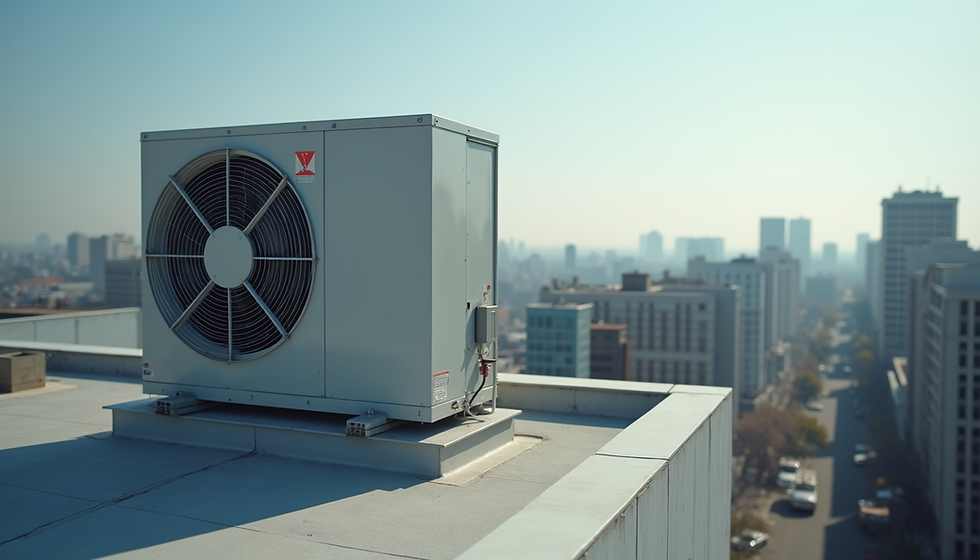Exploring Comprehensive Solutions for Your Commercial HVAC Needs
- Aug 26, 2025
- 4 min read
In today's fast-paced business environment, maintaining a comfortable and efficient indoor climate is essential for any commercial establishment. Whether it's an office building, retail space, or industrial facility, a well-functioning HVAC (Heating, Ventilation, and Air Conditioning) system is crucial for ensuring employee productivity, customer satisfaction, and overall operational efficiency. This blog post delves into comprehensive solutions for your commercial HVAC needs, exploring various aspects that can help you make informed decisions.
Understanding Commercial HVAC Systems
Commercial HVAC systems are designed to regulate temperature, humidity, and air quality in larger spaces compared to residential systems. These systems are more complex and require specialized knowledge for installation, maintenance, and repair. Understanding the different types of commercial HVAC systems available is the first step in determining the best solution for your needs.
There are several types of commercial HVAC systems, including:
Packaged Units: These systems combine heating and cooling components into a single unit, making them ideal for smaller commercial spaces.
Split Systems: Comprising an indoor and outdoor unit, split systems are versatile and can be used in various applications.
Variable Refrigerant Flow (VRF) Systems: These systems allow for individual temperature control in different zones, making them suitable for larger buildings with diverse heating and cooling needs.
Chilled Water Systems: Common in larger commercial buildings, these systems use chilled water to cool air, providing efficient temperature control.
Choosing the right system depends on factors such as building size, layout, and specific climate control requirements.
Importance of Energy Efficiency
Energy efficiency is a critical consideration when selecting a commercial HVAC system. Not only does an energy-efficient system reduce operational costs, but it also minimizes the environmental impact of your business.
Investing in energy-efficient HVAC solutions can lead to significant savings over time. Look for systems with high SEER (Seasonal Energy Efficiency Ratio) and EER (Energy Efficiency Ratio) ratings, as these indicate better performance and lower energy consumption. Additionally, consider implementing smart thermostats and building automation systems to optimize energy use further.
Regular maintenance is also essential for ensuring energy efficiency. Scheduling routine inspections and servicing can help identify potential issues before they escalate, keeping your system running smoothly and efficiently.
Indoor Air Quality (IAQ) Considerations
Indoor air quality is a vital aspect of any commercial HVAC system. Poor IAQ can lead to various health issues for employees and customers, including respiratory problems and allergies.
To enhance IAQ, consider the following solutions:
Air Filtration: Invest in high-quality air filters that can capture dust, pollen, and other airborne contaminants. Regularly replacing filters is crucial for maintaining optimal air quality.
Ventilation: Ensure proper ventilation to allow fresh air to circulate throughout the building. This can be achieved through natural ventilation or mechanical systems.
Humidity Control: Maintaining appropriate humidity levels is essential for comfort and health. Dehumidifiers or humidifiers can help regulate moisture levels in the air.
By prioritizing indoor air quality, you can create a healthier and more comfortable environment for everyone in your commercial space.
The Role of Smart Technology
The integration of smart technology into commercial HVAC systems is revolutionizing the way businesses manage their heating and cooling needs. Smart HVAC systems offer advanced features that enhance efficiency, comfort, and control.
Some benefits of smart HVAC technology include:
Remote Monitoring and Control: Business owners can monitor and adjust their HVAC systems remotely, allowing for real-time adjustments based on occupancy and weather conditions.
Predictive Maintenance: Smart systems can analyze performance data to predict when maintenance is needed, reducing downtime and repair costs.
Energy Usage Insights: Detailed analytics on energy consumption can help businesses identify areas for improvement and optimize their HVAC systems for better efficiency.
Embracing smart technology can lead to significant cost savings and improved operational efficiency.
Choosing the Right HVAC Partner
Selecting the right HVAC contractor is crucial for ensuring the success of your commercial HVAC project. A knowledgeable and experienced contractor can provide valuable insights and guidance throughout the process.
When choosing an HVAC partner, consider the following:
Experience and Expertise: Look for contractors with a proven track record in commercial HVAC installations and maintenance.
Licensing and Certifications: Ensure that the contractor holds the necessary licenses and certifications to perform HVAC work in your area.
Customer Reviews and References: Check online reviews and ask for references to gauge the contractor's reputation and reliability.
Comprehensive Services: Choose a contractor that offers a full range of services, including installation, maintenance, and emergency repairs.
A reliable HVAC partner can help you navigate the complexities of commercial HVAC systems and ensure that your needs are met effectively.
Conclusion
In conclusion, comprehensive solutions for your commercial HVAC needs encompass a variety of factors, including system selection, energy efficiency, indoor air quality, smart technology integration, and choosing the right HVAC partner. By understanding these elements, you can make informed decisions that enhance the comfort and efficiency of your commercial space.
Investing in a well-designed and maintained HVAC system not only improves the indoor environment but also contributes to the overall success of your business. As you explore your options, remember to prioritize energy efficiency and indoor air quality, and seek the expertise of qualified professionals to guide you through the process.






Comments